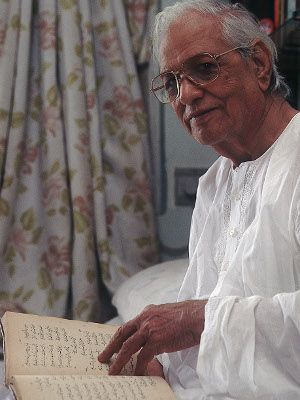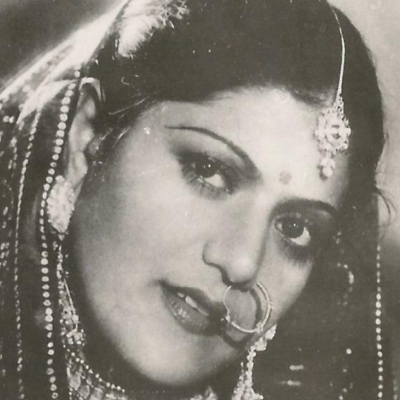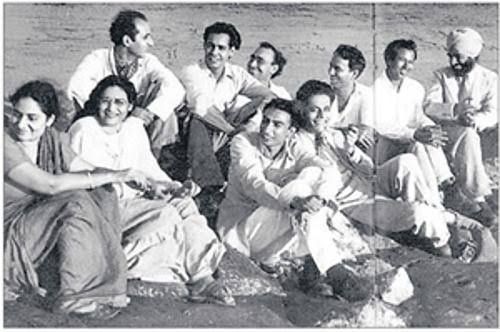Majrooh Sultanpuri

Subscribe to read full article
This section is for paid subscribers only. Our subscription is only $37/- for one full year.
You get unlimited access to all paid section and features on the website with this subscription.
Not ready for a full subscription?
You can access this article for $2 , and have it saved to your account for one year.
- Real Name: Asrar-ul-Hasan Khan
- Born: 1 October 1919
- Died: 24 May 2000
- Primary Cinema: Hindi
- Spouse: Firdaus Jahan Sultanpuri
Majrooh Sultanpuri may have become more famous for his many memorable Hindi film songs, yet he was a revolutionary poet first and foremost, and one of the finest avant-garde Urdu poets of 20th-century literature. His contributions to the development of a sensibility and idiom inspired by the Progressive Writers Movement, is enormous, as was his contribution to the Hindi film industry, which honoured him by bestowing him with the Dadasaheb Phalke Award for Lifetime Achievement in 1993 – the first time that a lyricist was thus awarded. Dominating the musical scene in Indian cinema in the 1950s and early 1960s in a career spanning six decades, he wrote several timeless songs, well-deserving of the commemorative postal stamp issued on him in 2013.
He was born Asrar-ul-Hasan Khan in Uttar Pradesh on 1 October 1919, into a humble family. Enrolled at a madrasa, where he became proficient in religious studies, Urdu and Persian, he went on to earn a degree in Unani medicine. At this point, he changed his name to Majrooh, meaning the wounded one. His path took a new course when he recited a ghazal at a mushaira, which became a hit. This saw him focus more on poetry, as he went on to become a disciple of the poet Jigar Moradabadi, who was the uncrowned king of mushairas (poetic soirées). Majrooh accompanied Moradabadi to Bombay in 1945 to take part in a mushaira where his poetry ended up impressing filmmaker A.R. Kardar, who was keen that he become a lyricist for his film. Majrooh however, who did not think highly of films, was not at all keen. However, convinced by Moradabadi about the possibility of earning well and supporting one’s family through films, Majrooh accompanied Moradabadi to a meet with music composer Naushad. Put to the test, Majrooh wrote Jab usne gesu bikhraye, badal aaye jhoom ke… to the metre that Naushad had assigned. It met with his approval and Majrooh was signed on as the lyricist of Shah Jehan (1946). He wrote seven songs for the film, starring K.L. Saigal, which were composed by Naushad. The songs became very popular, in particular Gham diye mustakil and Jab dil hi toot gaya. It was followed by S. Fazil's Mehndi, Doli (1947), Mehboob's Andaz (1949), which is widely considered his breakthrough film, and Shahid Latif's Aarzoo (1950), which helped establish Majrooh as a lyricist and songwriter of repute.
However, at this point, Sultanpuri’s leftist leanings created problems for his budding career. Shunning traditional Urdu poetry and its themes of life, love, and romanticism, his poetry instead spoke of breaking barriers. Composing couplets for private projects, books, and the Progressive Writers’ Movement, he, along with other poets and writers from India and Pakistan, would congregate in public to share their views on atrocities committed by governments. He recited a poem at a mill union workers’ meeting in 1949, which severely chastised Prime Minister Jawaharlal Nehru. He was jailed along with other leftists, including Balraj Sahni, during a nationwide arrest of communists after the second Congress of the Communist Party of India. Asked to apologize, Majrooh refused and was sentenced to two years in prison.
Sultanpuri was dismissive of his work in Hindi films, dubbing Hindi films a farce. Yet in the course of his long and eventful career, he worked with many music directors, including Anil Biswas, Naushad, Madan Mohan, O.P. Nayyar, Roshan, Laxmikant-Pyarelal, Jatin-Lalit, and Anand-Milind. His best work was with S.D. Burman and R.D. Burman. The Majrooh-S.D. Burman collaboration brought forth melodious songs in films like Paying Guest (1957), Nau Do Gyarah (1957), Sujata (1959), Kala Paani (1958), Teen Deviyan (1965), and Jewel Thief (1967). With R.D. Burman he created vivacious, electric dance numbers like O mere sona re sona re sona (Teesri Manzil, 1966), Piya tu ab to aaja (Caravan, 1971), Chura liya hai tumne jo dil ko (Yaadon Ki Baraat, 1973) and more. Winning the Filmfare Best Lyricist Award for the song Chahunga main tujhe in the film Dosti (1965), he produced outstanding work in Nasir Hussain's musicals like Teesri Manzil (1966), Yaadon Ki Baraat (1973) and Hum Kisi Se Kum Nahin (1977).
The 1980s and 1990s saw Sultanpuri work mostly with Anand-Milind, collaborating in films like Qayamat Se Qayamat Tak (1988), Lal Dupatta Malmal Ka (1989), Kurbaan (1991) and Dahek (1999). His pairing with Jatin-Lalit for films like Yaara Dildara (1991) and Jo Jeeta Wohi Sikander (1992) resulted in hits like Pehla nasha and Bin tere sanam, which still remain popular today. Additionally, Sultanpuri, whose mother tongue was Awadhi, also successfully wrote lyrics for several Bhojpuri films.
Sultanpuri worked in approximately 350 films in the course of his 50-odd-year-long career. Proficient in shayari, qawwali, bhajan, ghazals, mujra, folk songs, cabaret and typical Hindi film songs, his versatility was admirable. From Jab dil hi toot gaya toh jeekar kya karnege (Shah Jehan) to Aaj main oopar aasman neeche (Khamoshi - The Musical, 1996), this legendary lyricist could create songs to match a gamut of moods and emotions.
After his first film itself, Sultanpuri had absorbed lessons from the popular lyricists who had preceded him, namely Aarzu Lakhnavi, Kedar Sharma and DN Madhok. He assimilated the fact that background score played a more important part than words in film music, and those film songs needed to be delivered in the language of the masses to achieve popularity. Even as his style changed and grew more refined as he worked with successive generations of music composers, he grew more adept at expressing intense emotions in simple words. He is also credited with starting the trend of writing a song in question-answer style, starting his verses in an unusual and profound way as seen in songs like Teri aankhon ke siva duniya me rakha kya hai, and Chirag dil ka jalao bahut andhera hai (both Chirag, 1969).
The last of the group of lyricists, including Sahir Ludhianvi, Shailendra and Shakeel Badayuni who reigned over Hindi cinema in the early 1950s and 1960s, Majrooh Sultanpuri stayed contemporary and relevant, right up to his demise on 24 May 2000, aged 80.








.jpg)




